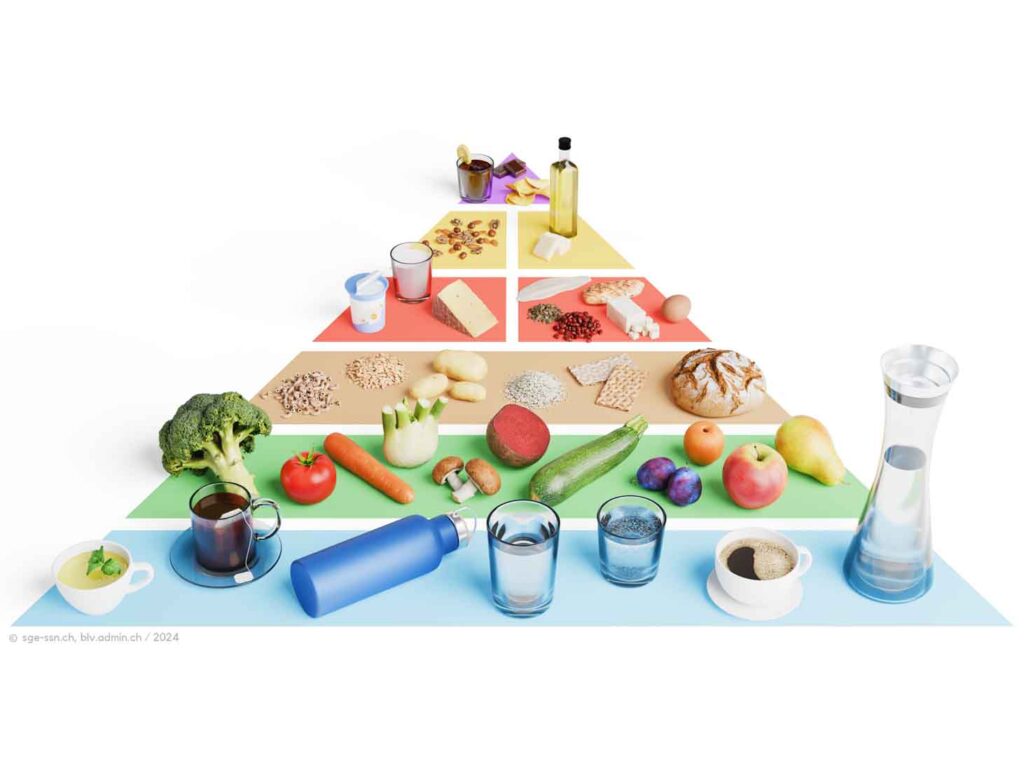In response to evolving scientific knowledge and environmental concerns, Switzerland has introduced updated dietary guidelines that aim to promote not only healthy eating but also sustainable living. The Swiss Food Safety and Veterinary Office (FSVO) and the Swiss Society for Nutrition (SSN) unveiled these recommendations on September 11, 2024. They reflect the latest research findings and encourage a holistic approach to nutrition, considering individual health and ecological sustainability.
Key Updates in the Swiss Dietary Guidelines
The revised Swiss Dietary Recommendations represent a significant shift from earlier guidelines, focusing not only on a balanced and nutritious diet but also on promoting sustainable food choices. These new guidelines underscore the importance of whole foods, local and seasonal products, and the reduction of processed food consumption. Additionally, the recommendations promote physical activity and responsible consumer practices to reduce food waste.
Swiss Food Pyramid: A Comprehensive Guide
Central to the updated recommendations is the Swiss Food Pyramid, which provides detailed guidance for healthy eating. The pyramid serves as a practical visual aid, helping individuals make informed food choices. The main components of the pyramid include:
- Beverages
Drink regularly. Water is best.
Adults should consume 1–2 liters of unsweetened beverages per day, with water, either tap or mineral, being the preferred choice. Herbal and fruit teas are also recommended, while caffeinated drinks like coffee and black tea can count toward fluid intake if consumed in moderation. - Fruit and Vegetables
Colourful and seasonal.
The pyramid advises consuming five portions of fruits and vegetables daily, including three portions of vegetables and two portions of fruit. A portion equals approximately 120g or a handful. To enhance nutrition and sustainability, individuals are encouraged to prioritize seasonal, colorful produce. - Cereal Products and Potatoes
Focus on wholegrain products.
The guidelines recommend three portions of cereal products or potatoes daily, with at least half being wholegrain. Examples of these foods include bread, pasta, rice, and potatoes. Wholegrain options are rich in fiber and nutrients, offering health benefits over refined alternatives. - Dairy Products
Preferably unsweetened.
The pyramid advises consuming 2–3 portions of dairy daily, such as milk, yoghurt, or cheese, with an emphasis on unsweetened varieties. Dairy products provide essential nutrients like calcium and protein but should be chosen mindfully to avoid excess sugar intake. - Pulses, Eggs, Meat, and Other Protein Sources
Enjoy a variety. Pulses on a regular basis.
A balanced diet includes a daily portion of protein-rich foods. The recommendations encourage varying protein sources throughout the week, including plant-based proteins like lentils, beans, and tofu, as well as eggs, meat, and fish. Pulses are particularly emphasized for their health and environmental benefits, and meat consumption should be limited to 2–3 times per week. - Nuts and Seeds
Enjoy daily in small quantities.
Nuts and seeds are rich in healthy fats and micronutrients. A small handful, or 15–30 g of unsalted nuts or seeds is recommended daily to contribute to heart and brain health. - Oils and Fats
Vegetable oils are preferable.
Vegetable oils, particularly rapeseed oil, are encouraged as the primary source of dietary fat. The guidelines recommend two tablespoons of oil per day, while advising moderation in the consumption of butter, margarine, and other high-fat foods. - Sweetened Beverages, Sweets, and Salty Snacks
In small amounts.
While these foods can be enjoyed occasionally, the pyramid recommends limiting them to 0–1 portion per day. Sweetened beverages, sugary snacks, and salty foods should be consumed in moderation to avoid excessive sugar and salt intake, both of which are linked to chronic health issues like obesity and hypertension.

Physical Activity for Well-being
The new dietary recommendations emphasize the importance of incorporating physical activity into daily life. Adults are encouraged to engage in 150 to 300 minutes of moderate-intensity endurance exercise, such as walking, cycling, or gardening, or 75 to 150 minutes of high-intensity exercise like jogging or swimming each week.

Promoting Sustainability and Reducing Food Waste
A core principle of the 2024 recommendations is sustainability. The guidelines encourage the consumption of seasonal, regional products, which not only support local economies but also reduce the environmental impact of food transportation. In addition, Swiss consumers are advised to adopt responsible shopping habits to reduce food waste. Planning meals, storing food properly, and consuming leftovers can significantly reduce household waste and contribute to environmental sustainability.
Health Promotion through Dietary and Lifestyle Changes
One of the most important aspects of the updated guidelines is their emphasis on the prevention of non-communicable diseases (NCDs) such as cardiovascular diseases, type 2 diabetes, and obesity. The focus on reducing the intake of processed foods, incorporating a variety of plant-based proteins, and increasing physical activity all aim to mitigate the risk of these diseases.
Concluding Thoughts
The 2024 Swiss Dietary Recommendations provide a forward-thinking framework for healthy and sustainable eating. By encouraging a varied diet rich in whole grains, fruits, vegetables, and plant-based proteins, while reducing the consumption of processed foods, these guidelines aim to improve public health outcomes. Additionally, the integration of sustainability considerations reflects Switzerland’s commitment to addressing the environmental challenges associated with food production and consumption. These guidelines offer a comprehensive and practical roadmap for Swiss citizens to live healthier and more eco-friendly lives.
For more information:
Swiss Society for Nutrition (SSN). Swiss Dietary Guidelines. FSVO, 2024.

